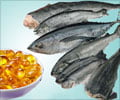According to new study on fruit flies, a diet of the right mix of proteins may be more important than reducing calories for a long and healthy life.
According to new study on fruit flies, a diet of the right mix of proteins may be more important than reducing calories for a long and healthy life.
According to researchers, the study could help explain why 'dietary restriction' (also known as calorie restriction) - reducing food intake whilst maintaining sufficient quantities of vitamins, minerals and other important nutrients - appears to have health benefits.In many organisms, such as the fruit fly (drosophila), mice, rats, and the Rhesus monkey, these benefits include living longer.
Previous studies have shown that dietary restriction can have health benefits for humans, too, though it is unclear whether it can increase longevity.
However, dietary restriction can have potentially negative side effects - diminished fertility.
For example, the female fruit fly reproduces less frequently on a low calorie diet and its litter size is reduced, though its reproductive span lasts longer.
To understand whether the health benefits of dietary restriction stem from a reduction in specific nutrients or in calorie intake in general, researchers at the Institute of Healthy Ageing, UCL (University College London), measured the effects of manipulating the diet of female fruit flies.
Advertisement
Amino acids are the building blocks of life as they form the basis of proteins. Methionine is one of the most important amino acids at it is essential to the formation of all proteins.
Advertisement
In fact, when the researchers studied the effect further, they found that levels of a particular amino acid known as methionine were crucial to maximising lifespan without decreasing fertility.
Adding methionine to a low calorie diet boosted fertility without reducing lifespan; likewise, reducing methionine content in a high calorie diet prolonged lifespan.
"By carefully manipulating the balance of amino acids in the diet, we have been able to maximise both lifespan and fertility," said Dr Matthew Piper, one of the study's authors.
The results of the study are published today in the journal Nature.
Source-ANI
TRI










